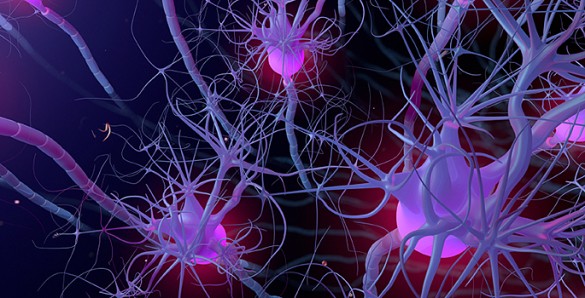Research at Vanderbilt University Medical Center aimed at developing potential new treatments for major depressive disorder, general anxiety disorder and post-traumatic stress disorder got a big boost this week from The William K. Warren Foundation of Tulsa, Oklahoma.
The foundation will increase its support of the research by $2.25 million over the next two years. That is in addition to a three-year, $5-million commitment made last year as part of a research collaboration agreement signed by the two non-profit institutions.
The goal of the research by scientists in the Vanderbilt Center for Neuroscience Drug Discovery (VCNDD) is to develop small molecules called “negative allosteric modulators,” or NAMs, which act on a key glutamate receptor in the brain.
Excessive and dysfunctional glutamate signaling has been linked to some mood and stress disorders. NAMs “tune down” activation of the receptor when it binds its neurotransmitter, glutamate, much like the dimmer switch in an electrical circuit.
The foundation’s support is essential to move compounds from laboratory and animal studies to the point where an investigational new drug (IND) application to test them in humans can be filed with the U.S. Food and Drug Administration (FDA), the researchers said.
The hope is that the Vanderbilt studies will make it less risky for a drug company to proceed with clinical development and, after gaining FDA approval, marketing, said Craig Lindsley, Ph.D., VCNDD co-director with P. Jeffrey Conn, Ph.D.
Lindsley, the William K. Warren Jr. Professor of Medicine, and Conn, the Lee E. Limbird Professor of Pharmacology, are leading the research effort with center colleagues Carrie Jones, Ph.D., and Colleen Niswender, Ph.D. VCNDD is a pioneer in the development of allosteric modulators.
The work is slow-going, and the risk of failure is high. Even if a candidate compound passes the rigorous safety and efficacy testing required of a potential new drug, it may be 2017 before it can be tested extensively in patients, and 2020 before it reaches the market, Lindsley said.
Most potential drugs don’t make it across what is often called the “Valley of Death.” But if the Warren Foundation-supported effort is successful, it could lead to development of a new class of drugs significantly more effective than current therapy and with fewer side effects, he said.
“The global costs and suffering due to mental illnesses are staggering,” said John-Kelly Warren, CEO of the William K. Warren Foundation. “The World Health Organization estimates the annual, global costs of mental illness at nearly $2.5 trillion. This annual, global cost is expected to rise to $6 trillion in 2030.
“The U.S. is not escaping this burden,” Warren said. “According to the National Institute of Mental Health, an estimated 43.7 million Americans 18 and older had a mental illness in the past year. That is 18.6 percent of all U.S. adults.
“The support we are providing to Vanderbilt through this negative allosteric modulator research, combined with the support we provided last year to the program targeting G-protein-coupled receptors, has the potential to be able to treat almost all of these adults.
“We are privileged and excited to continue our work with Craig, Jeff, Carrie, Colleen, and others to uncover the mysteries behind these illnesses and to possibly help provide more effective treatments,” Warren said.
The William K. Warren Foundation was created in 1945 by Mr. and Mrs. William Kelly Warren to provide the finest possible medical care and make enduring contributions to medical research, particularly in nervous system diseases. The goal is to improve lives, reduce societal costs and relieve human suffering.















